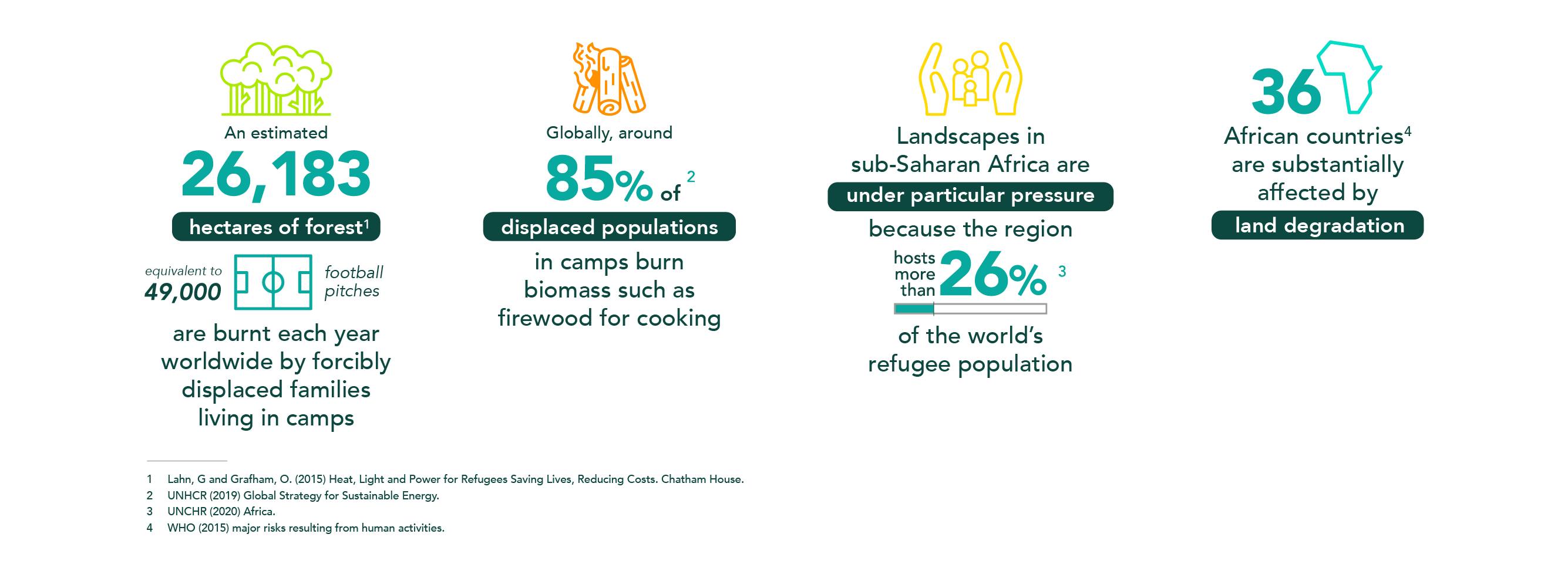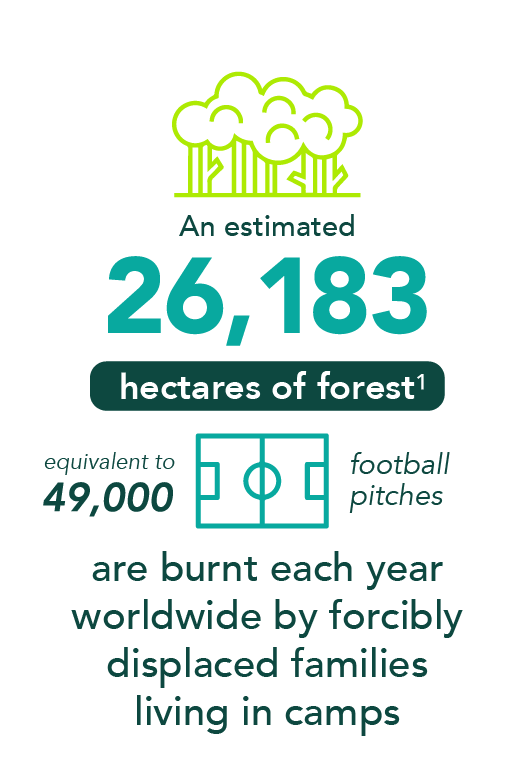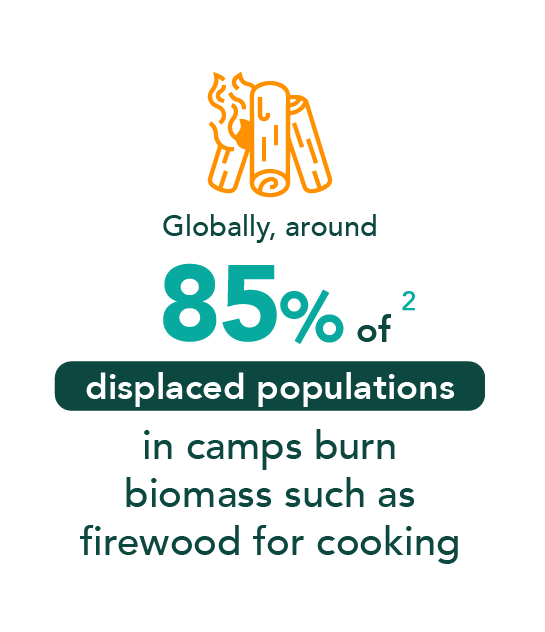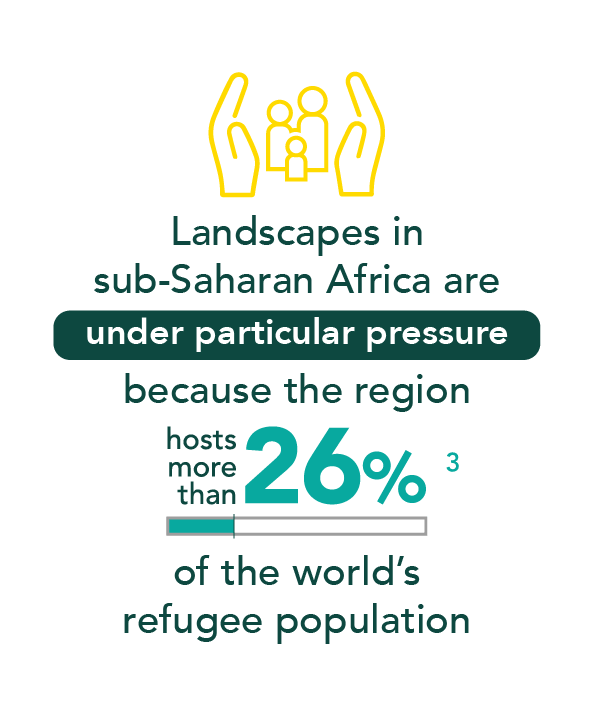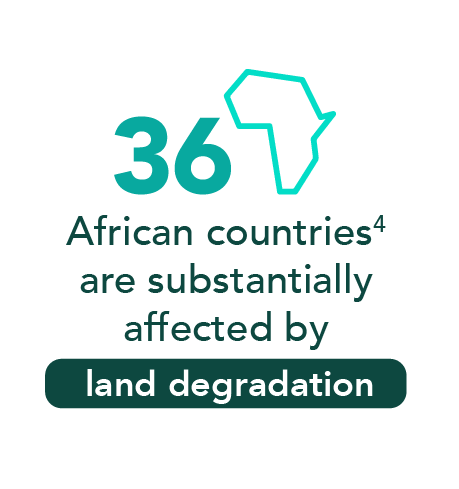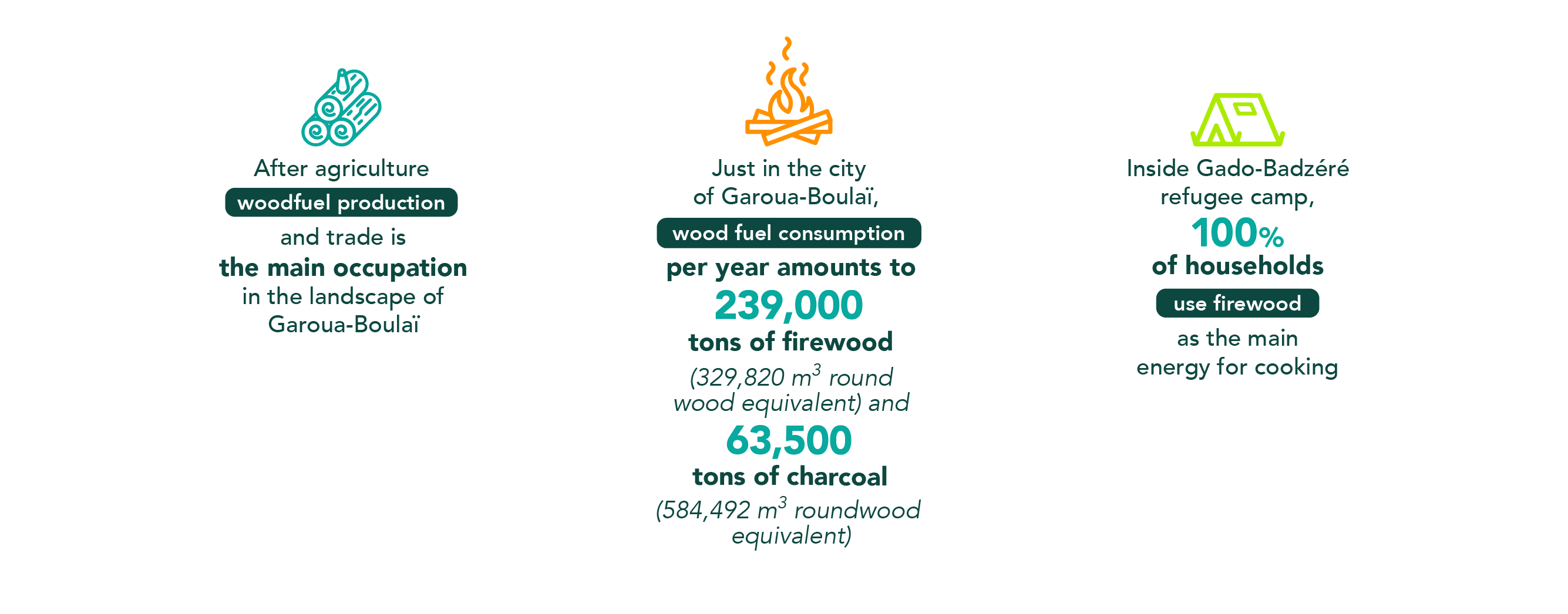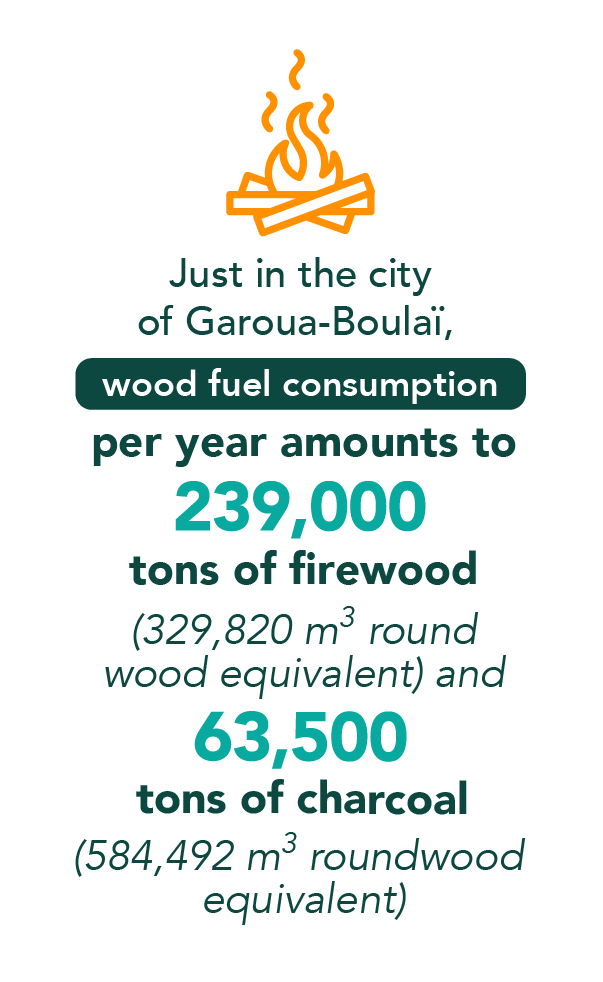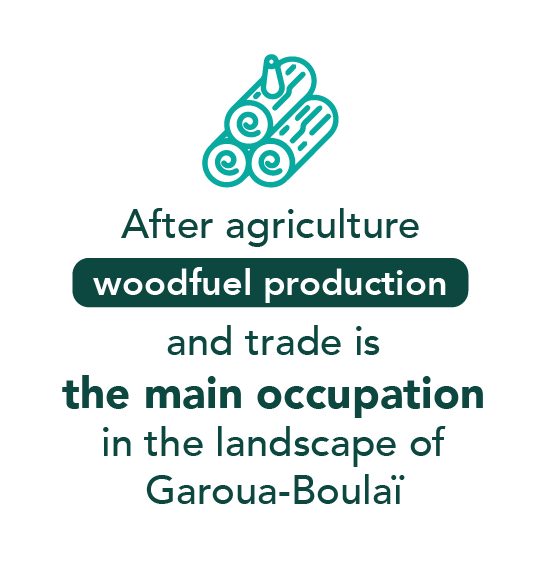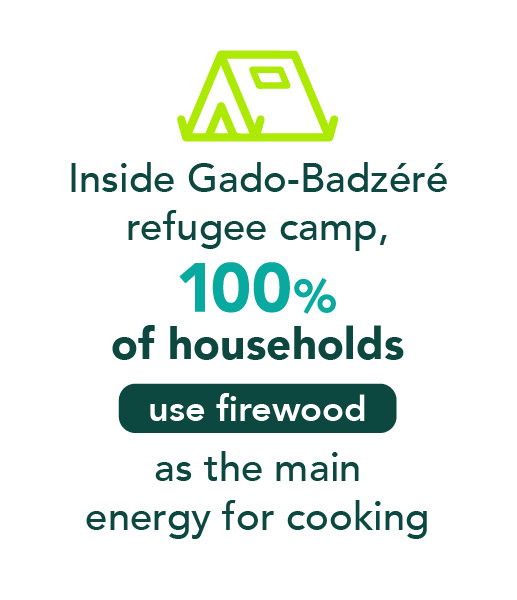We want you to share Forests News content, which is licensed under Creative Commons Attribution-NonCommercial-ShareAlike 4.0 International (CC BY-NC-SA 4.0). This means you are free to redistribute our material for non-commercial purposes. All we ask is that you give Forests News appropriate credit and link to the original Forests News content, indicate if changes were made, and distribute your contributions under the same Creative Commons license. You must notify Forests News if you repost, reprint or reuse our materials by contacting forestsnews@cifor-icraf.org.
In refugee settings, wood fuel significantly contributes to host and displaced populations’ food security and livelihoods. Therefore, it is crucial to find solutions that can enhance wood fuel’s socio-economic benefits, while minimizing its contribution to forest degradation and deforestation.

Why energy matters
in displacement contexts
When large numbers of refugees or internally displaced people settle in new communities or camps, a sharp surge in demand for natural resources can cause severe environmental and socioeconomic impacts in surrounding areas.
Wood fuel is generally used for cooking meals or boiling water, but unsustainable harvesting of wood puts additional pressure on land-use and ecosystems.
When tree species suited for use as fuel become scarce, the trek to find firewood becomes ever longer. Shortages hit women and girls particularly hard, because they are typically in charge of gathering wood. Walking longer distances does not only mean an extra domestic burden which restricts their ability to pursue other activities, such as agriculture and education, but it increases their risk of harassment and assault as they get further away from home.
Competition over scarce natural resources can also increase tensions. A 2014 survey conducted in Chad, Ethiopia, Kenya, and Uganda found that 30 percent of refugees had come into conflict with a host community while collecting firewood.
Difficulties accessing wood fuel can negatively impact food and nutritional security, limiting consumption of nutritious foods that take a long time to cook, such as cereals and beans. At the expense of their health, displaced families are at times in a position where they must reduce cooking time, cut the number of meals and stop boiling water.
They may also use substitutes, which may emit unsafe fumes, such as crop residues, leaves, twigs, maize cobs and cow dung. In worst-case scenarios, they need to buy firewood – a significant expense that might limits their ability to meet other basic needs.
Due to these challenges, enabling displaced people and host communities to meet their cooking energy needs in a safe and sustainable manner has become a pressing priority in humanitarian settings.
New solutions are needed to increase access to sustainable sources of wood fuel and include host communities and other stakeholders in efforts to minimize human impacts on the environment, while improving the protection and well-being of refugees.
“All refugees, host communities and support structures should be able to satisfy their energy needs in a sustainable manner, without fear or risks to their health, well-being and personal security, while ensuring the least possible environmental impact.”
– UNHCR

Why the energy and food nexus is critical in refugee contexts
Focus on: Central Africa
Since 2012, about 610,000 people have fled the Central African Republic due to civil war. Most of them have found shelter in neighboring countries, including Cameroon, the Democratic Republic of Congo and Chad. Cameroon alone hosts over 290,000 Central African refugees, who are now living in cities, villages, and refugee sites.
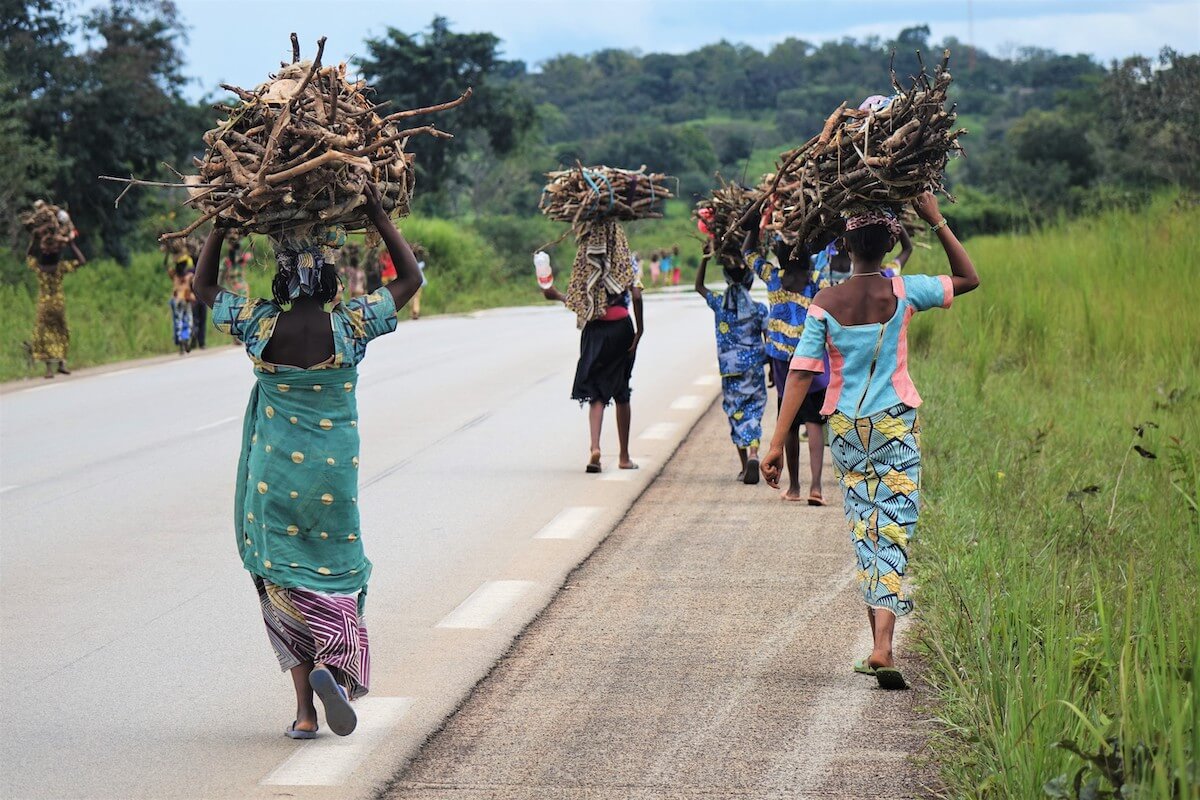
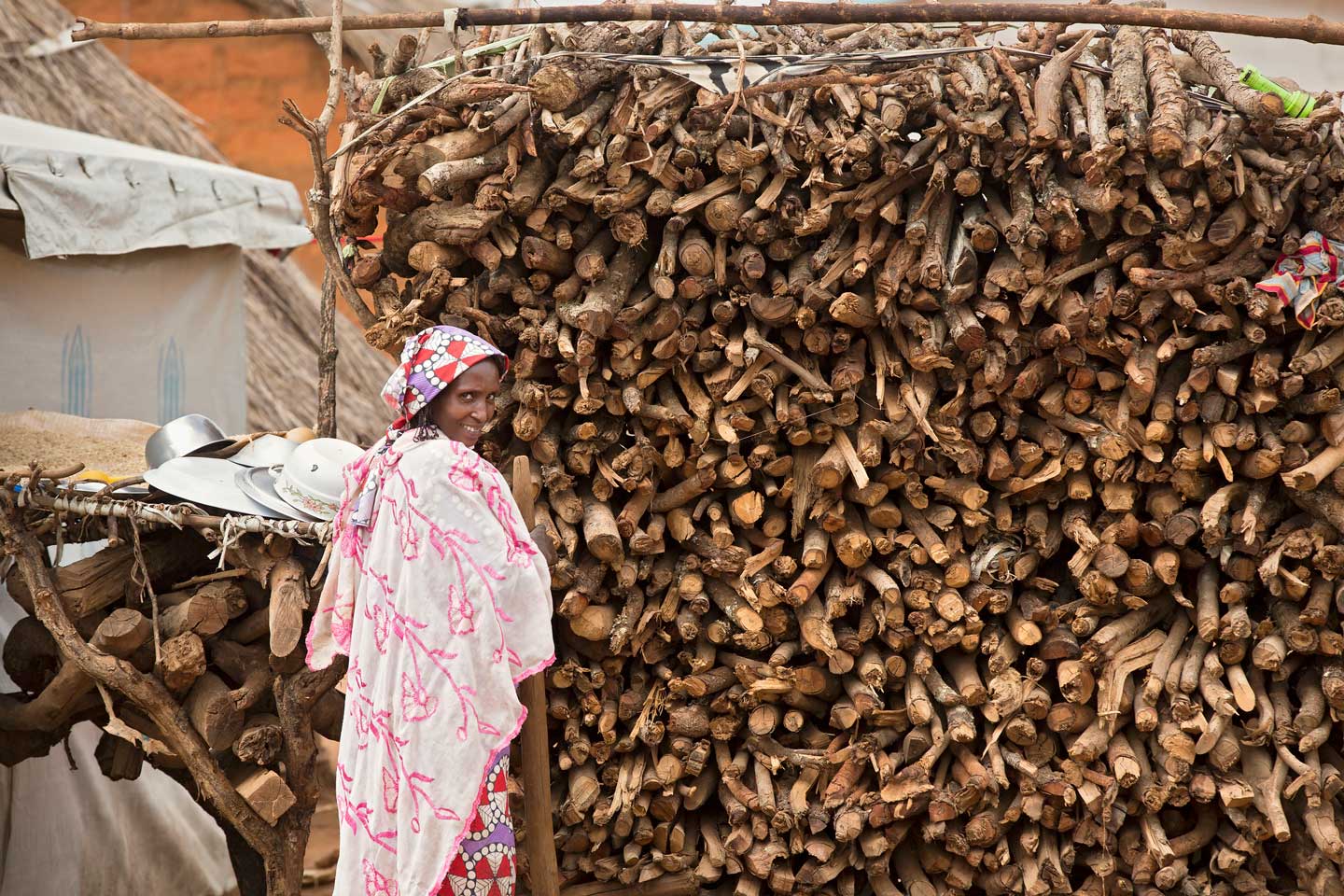
Cameroon’s East Region, the country’s largest and most sparsely populated administrative division, has absorbed most of the arrivals. Rapid population increase and soaring demand for natural resources has put additional pressure on the region and its livelihood opportunities, leading to persistent land use issues and conflicts among refugees and host communities.
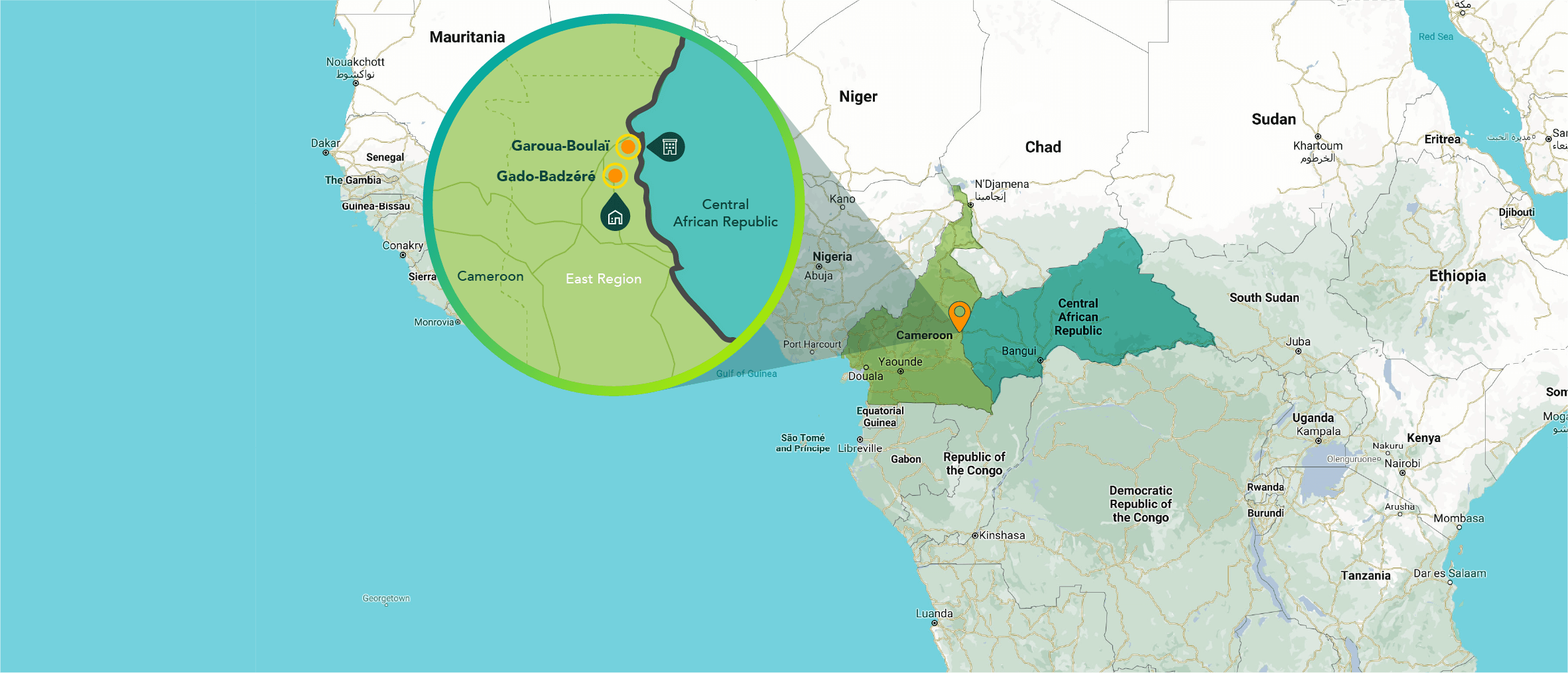
Since 2013, Garoua-Boulaï and other towns near the border with the Central African Republic, have been overwhelmed by a massive influx of refugees. A refugee camp was established in the village of Gado-Badzéré, which now hosts more than 25,000 people. However, most refugees are dispersed in the landscape, living within host communities.
Garoua-Boulaï and Gado-Badzéré are located in Cameroon’s forest-savanna transition zone, an area particularly sensitive to disturbances and landscape fragmentation from human activities. The landscape is vulnerable because it is shared by different user groups, who compete to use it for various purposes, including agricultural and pastoral activities.
Inside Gado-Bazéré camp, most women collect firewood for their families. The only sustainable alternative is a type of locally produced ecological charcoal. Yet at a cost of 300 francs CFA ($0.54) per kilo, it remains out of reach for the majority of refugees.
Outside the camp, firewood and charcoal trade are more common. Bundles of firewood or bags of charcoal are mostly sold along the National Road 1, the highway that links Garoua-Boulaï with the regional capital Bertoua. Wood fuel production and trade provide an important additional income for farmers.
After years of unchecked wood harvesting, the degradation of the surrounding forests and woodlands is becoming visible. Favored tree species for firewood and charcoal production, including shea trees (Butyrospermum parkii), African cherry (Prunus africana) and dwarf red ironwood (Lophira lanceolata), are becoming increasingly difficult to find.
In her words: Women speak up on the challenges of resource depletion

Maïmouna Bouba: A man claimed that my firewood belonged to him
Since she arrived in Cameroon seven years ago, Maïmouna Bouba has experienced a daily struggle to gather firewood for cooking and washing in the refugee camp at Gado Badzéré. Now, wood has become scarcer than before.
“Sometimes we [refugee women] have to walk very far,” she said. “We don’t own fields where we can harvest wood, so we have to go to the bush and get dirty.”
The already “dirty” task becomes even dirtier after bushfires because ashes stain the bodies and clothes of the women who continue going out to harvest.
It is challenging during the rainy season too, as the firewood becomes wet and smoulders when lit, rather than igniting: “We light the fire with great difficulty; we fan the fire to the point that our eyes redden,” Bouba said.
Harvesting wood is also risky, even in large groups. The women frequently run into problems with men and local landowners. One time, Bouba was returning to camp with a group of 10 other women, each carrying a bundle of wood. They were stopped by a man who told them to give him all their wood, claiming they had harvested it from his field, so it belonged to him.
Leaving the wood with the man, the women returned home empty-handed. They went to complain to the local chief and offered to pay his transportation to meet with the man and check the facts.
“We went to the man’s house and the chief explained to him that we are refugees and that we wanted firewood to cook for our children,” Bouba said. “I told the gentleman that I cannot afford to buy either firewood or charcoal; I need the wood that nature offers in the bush to cook for my children.”
Fortunately, the chief sided with Bouba and her companions, and the man agreed to give them their firewood back. Still, they have not gone back to that area to look for wood since that encounter.
Conflicts like these make it difficult for refugee women to meet their basic needs without putting their safety and well-being at risk.
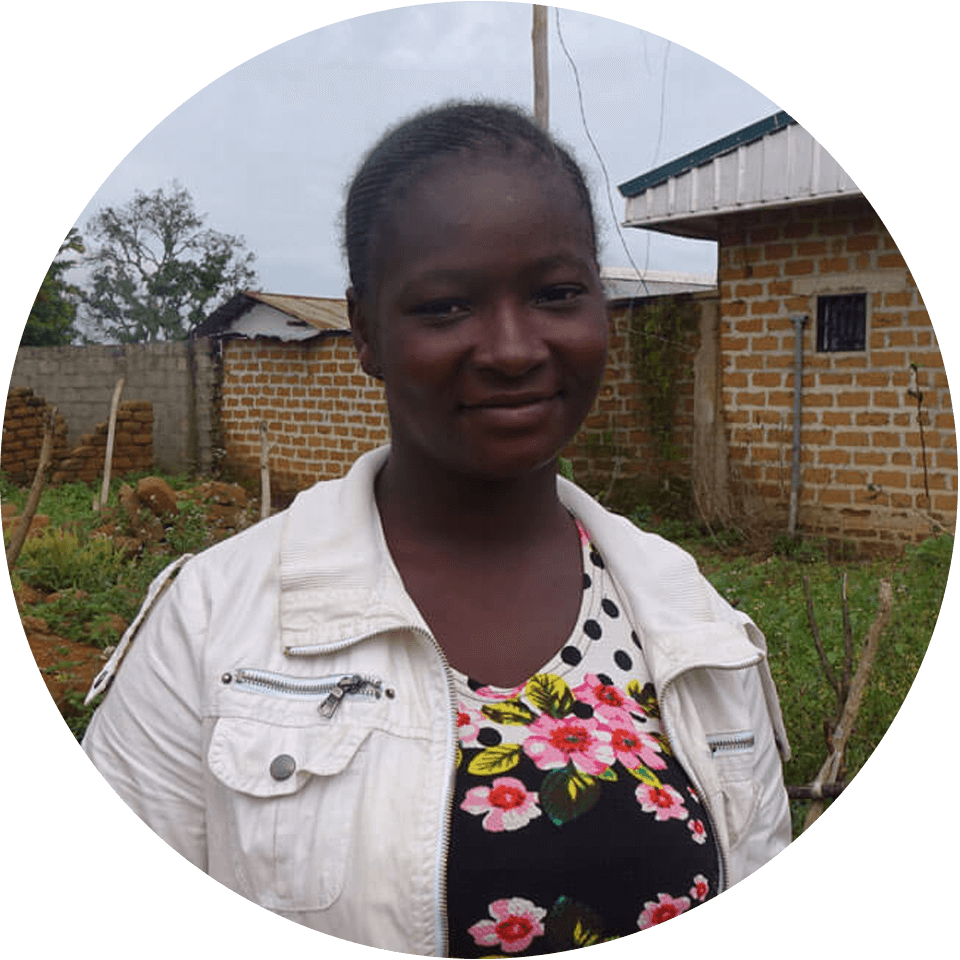
Angeline Nandoe: Refugee women take our firewood
About four times per week, Angeline Nandoe goes to the bush with her friends to harvest wood for her family. As a native Cameroonian, Nandoe has always relied on collecting firewood for cooking on her three-stone-stove. These days, however, “to find wood is not easy since there are refugees who come to the same spots.” Angeline and other local women must travel increasingly long distances to find what they need.
Transporting the wood from such a distance poses another problem. Often, the women have to settle with collecting less than they need because it’s difficult to carry the heavy load all the way home. It’s possible to leave some in the bush for the next day, “but sometimes when we come back, we find that [refugee] women have taken it,” she said.
Following the roads, it’s often possible to catch up with the women who have taken the wood, but that “leads to a whole other problem.” Settling the dispute requires going to the local chief and naming the people who stole the wood — provided you know. He can then judge the dispute.
Nandoe believes access to transportation is the best solution to make sure the wood she collects gets home the same day.
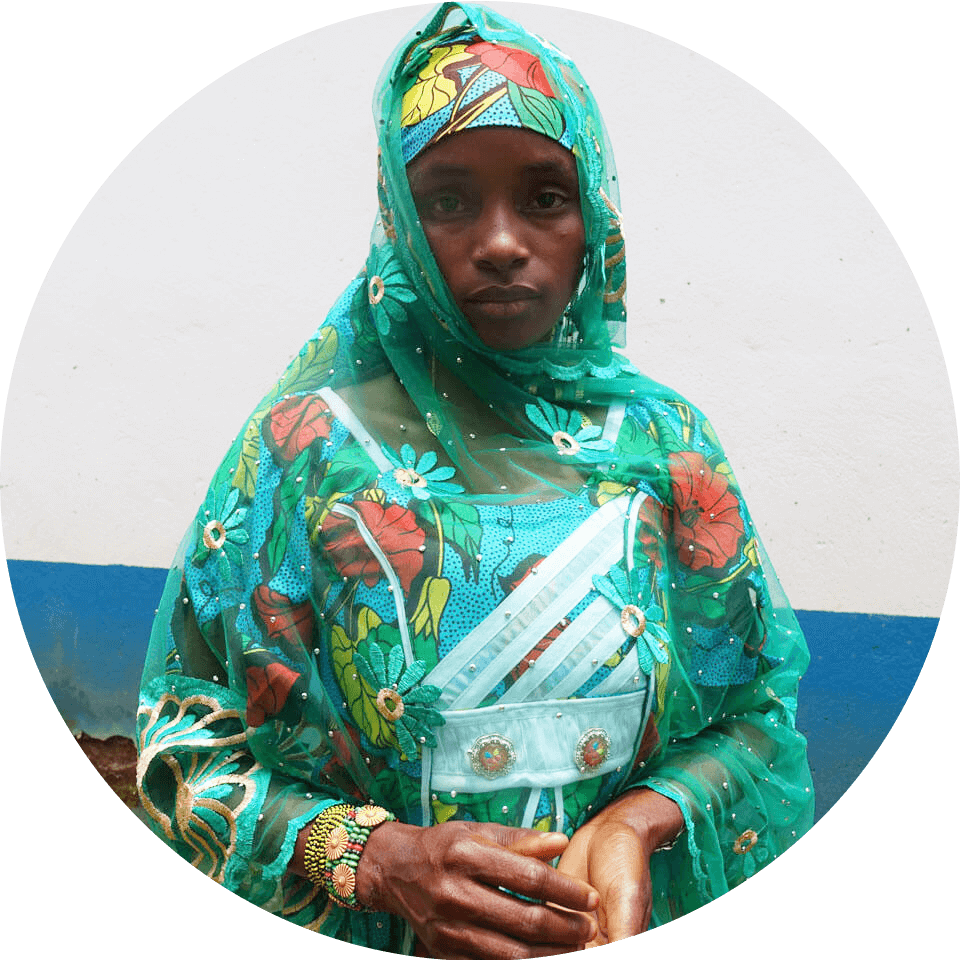
Hadidjatou Boboï: Sometimes we have to skip meals
Standing in front of a white-painted concrete wall, Hadidjatou Boboï answered questions directly and frankly: “Yes. I have a lot of difficulty with wood, because when I go to look for it, I can’t find enough, and I have to walk very far,” she said.
Since 20-year old Boboï arrived in Gado-Badzéré with her mother and stepfather six years ago, wood collecting has been a daily struggle. Sometimes, she is chased away and sometimes there is so little to be found that she resorts to skipping the midday meal to save firewood.
“It has already happened to me that when I go fetch wood, I get threatened, or people steal my firewood and I must come home empty handed. Sometimes we even have our machetes stolen,” she added.
When things are stolen, she rarely complains to the local chief because she knows these things happen often here; the situation is difficult for everyone, but people can manage.
Once at home, Boboï cooks using a “stove” made of three bricks laid in a triangle shape on the ground. However, the it consumes wood very quickly: “I need four pieces of wood to cook a meal,” she said.
Boboï told us she would willingly help plant trees if it meant there would be wood closer to home instead of having to walk long distances and risk being robbed or worse.
Making woodfuel part of the solution
Since 2018, the Center for International Forestry Research (CIFOR), World Agroforestry (ICRAF) and local partners have been supporting an integrated landscape intervention in Garoua-Boulaï and Gado-Badzéré. It engages local communities and refugees in joint restoration initiatives and sustainability improvements along the woodfuel value chain.
Supported by the European Union, ongoing activities include developing agroforestry systems with native food trees to increase local tree cover and support nutritious diets, as well as fast-growing species that can be used for fuel; holding consultation forums to negotiate land-use norms and minimize conflict; and promoting the use of energy efficient stoves that use less wood.
“This model brings together refugees, host communities, traditional authorities, local governments, and other relevant stakeholders to jointly engage in a long-term strategy that can ensure sustainable woodfuel supply and mitigate its negative environmental impacts.”
– Abdon Awono, CIFOR scientist

Empowering refugees and host communities to protect Cameroon’s forests
Contribution to the
Sustainable Development Goals:

Project coordination: Ahtziri Gonzalez | Video: Daniella Silva and Aris Sanjaya | Infographics: Juan Pablo Ramos | Field stories: Daniella Silva and Arnauld Chyngwa | Web design: Gusdiyanto and Dodi Hidayatullah | Editor: Julie Mollins

Through the GML project, CIFOR-ICRAF aims to contribute to develop more sustainable woodfuel value chains across Sub-Saharan Africa, with a focus on Cameroon, the Democratic Republic of Congo (DRC), Zambia and Kenya, and extending to neighboring countries regarding cross-border trade.
To learn more, please visit our project website:
Copyright policy: We want you to share Forests News content, which is licensed under Creative Commons Attribution-NonCommercial-ShareAlike 4.0 International (CC BY-NC-SA 4.0). This means you are free to redistribute our material for non-commercial purposes. All we ask is that you give Forests News appropriate credit and link to the original Forests News content, indicate if changes were made, and distribute your contributions under the same Creative Commons license. You must notify Forests News if you repost, reprint or reuse our materials by contacting forestsnews@cgiar.org.
We want you to share Forests News content, which is licensed under Creative Commons Attribution-NonCommercial-ShareAlike 4.0 International (CC BY-NC-SA 4.0). This means you are free to redistribute our material for non-commercial purposes. All we ask is that you give Forests News appropriate credit and link to the original Forests News content, indicate if changes were made, and distribute your contributions under the same Creative Commons license. You must notify Forests News if you repost, reprint or reuse our materials by contacting forestsnews@cifor-icraf.org.
